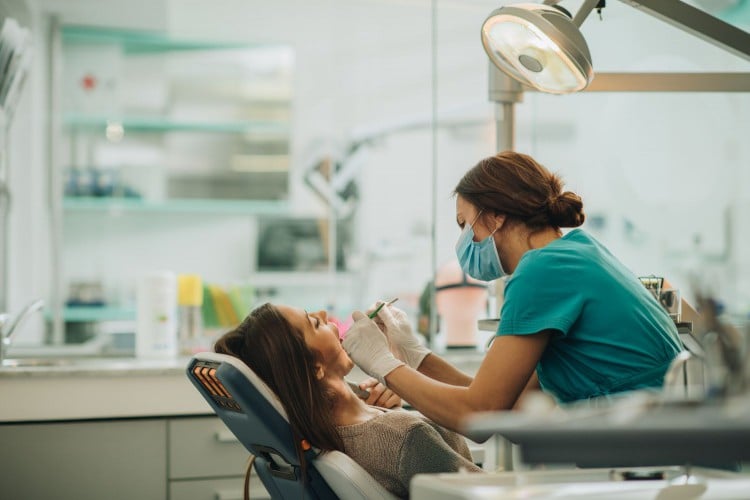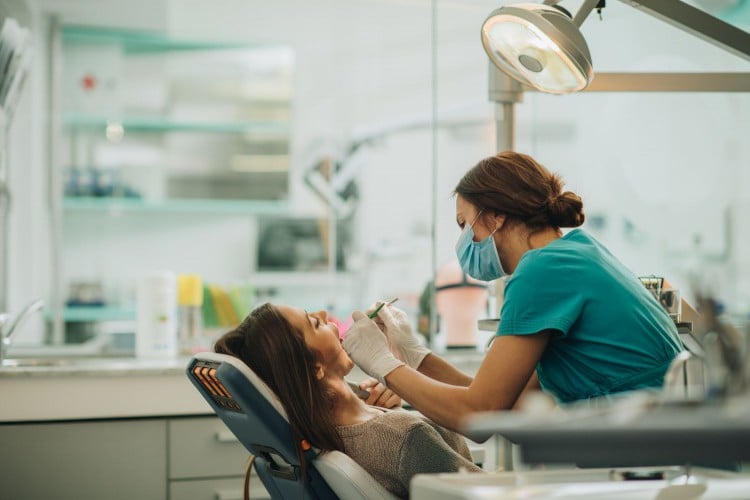
New research found that good oral hygiene could increase a person’s chance of survival if they experience head or neck cancer.
More frequent dentist visits were found to help catch cancer at earlier stages, which often makes it easier to treat.
Experts recommend maintaining a regular schedule of dental visits.
Good oral hygiene could help your chance of survival from head or neck cancer, a new study finds.
Going to the dentist isn’t just to make your teeth look better—maintaining oral hygiene can impact a variety of overarching health factors. Among them, head and neck cancer.
Head and neck cancers include cancers of the throat, mouth, oral cavity, voice box, paranasal sinuses and nasal cavity, neck, and salivary glands. These cancers account for about 4% of cancer diagnoses and deaths in the United States.
A new study found people who have better oral hygiene in the years before developing cancer may be better off in the long run.
“People who regularly have dentist appointments are more likely to have their cancer detected early,” he told Health, noting that catching cancer early is crucial for outcomes, since cancer that is detected early, before it’s spread, is easier to treat.

Routine Dental Visits Contribute to Catching Cancer Early
For the new study, Tasoulas and team looked at four studies that together included nearly 2,500 people from eight countries. All had been diagnosed with head and neck squamous cell carcinoma.
The data, which came from the University of North Carolina’s International Head and Neck Cancer Epidemiology Consortium, included information on each person’s periodontal, or gum, disease, as well as how often they brushed their teeth and whether or not they used mouthwash.
They also took into account the number of natural teeth each person had and the number of times they visited the dentist over the 10 years prior to their cancer diagnosis.
The team found that people who frequently visited the dentist—more than five visits in a 10-year span—had 20% higher survival rates 5 years after their cancer diagnosis. This bumped to nearly 30% after 10 years.
This finding was most clear among people with cancers of the oropharynx, which includes areas of the back of the throat, including the base of the tongue, tonsils, and soft palate.
The other strongest association they found was tied to the number of natural teeth a person had.
People who did not have any remaining natural teeth had a 15% lower five-year survival rate compared with those who had more than 20 natural teeth left (humans have 32 adult teeth).
Personal hygiene practices including tooth brushing and mouthwash use did not significantly increase a person’s head and neck cancer outcomes, nor did whether or not they experienced gum bleeding, which can be a sign of gum disease like gingivitis.
Importantly, the study was not able to determine the cause of death, that is, whether someone died of head and neck cancer or of something else, such as a car accident or heart disease.
Still, the research builds on past studies that have yielded similar results.
While past research has attributed the link between oral hygiene and head and neck cancer survivorship to oral health being a reflection of a person’s overall health, Tasoulas said there’s likely more to the connection, since there was no association between survival and other wellness habits such as getting a colonoscopy or regular eye exams.
The first, as Tasoulas mentioned, is early detection. Although regularly visiting the dentist was strongly associated with better cancer outcomes, early detection, even by professionals, can be challenging given the location of head and neck cancers.
“The oral cavity has variable tissues—there are lots of nooks and crannies—and it’s dark,” Epstein said. “Self-exam is challenging as is a medical exam, however, more regular dental care may do a number of things.”
Additionally, side effects of cancer treatments, most notably chemotherapy, can cause dry mouth, which is an oral health risk factor. If early detection of cancer saves an individual from undergoing chemotherapy, they may see better oral health and a higher likelihood of survival.
A study published earlier this summer found that head and neck cancer diagnoses related to human papillomavirus (HPV), the most common sexually transmitted infection (STI), are expected to surpass those caused by using tobacco and alcohol.
A person’s genes also play a big role in oral health.
Research conducted by the National Institute of Dental and Craniofacial Research, which was published in 2019, found that 47 areas of the human genome were linked to tooth decay. This means a person’s genetics may play a sizable role in the number of adult teeth they lose later in life.
For now, Epstein said a person’s best bet is to schedule regular dentist visits.
“If we can prevent cancers, that is clearly the best choice,” he said. “But if we can treat them better simply by having better oral hygiene and dental care, that’s a gold standard to strive for.”
The Best Natural Toothpastes for a Healthy Smile, According to Dentists



















